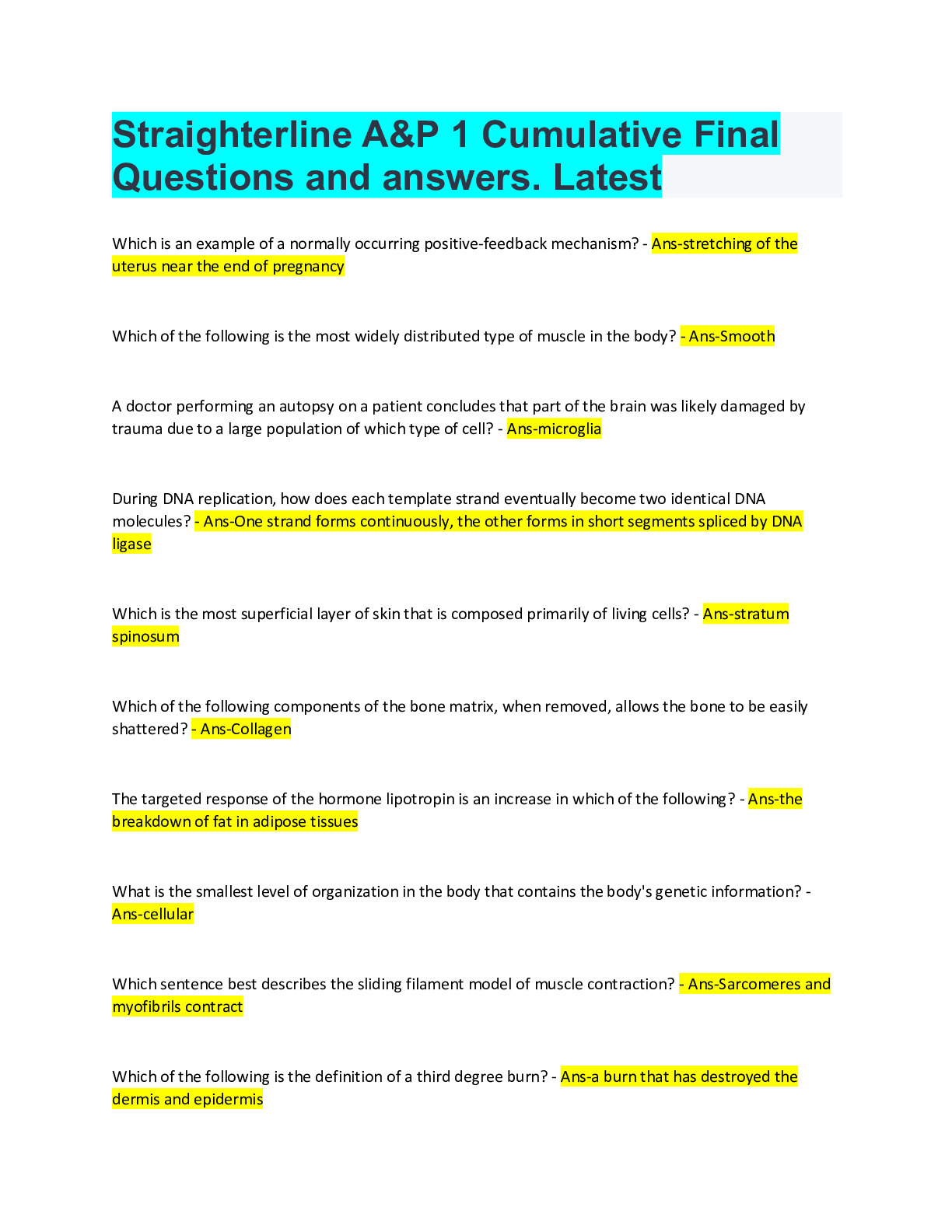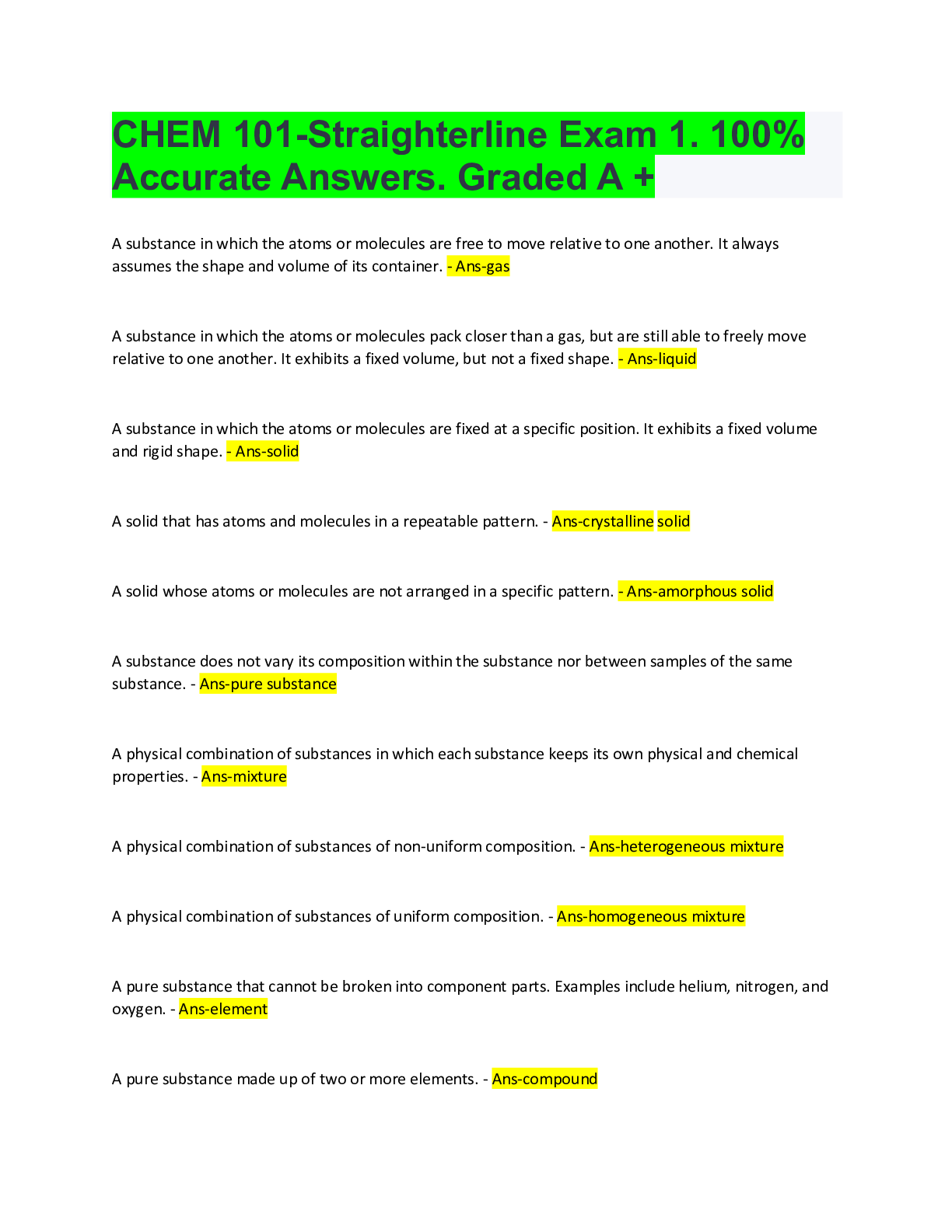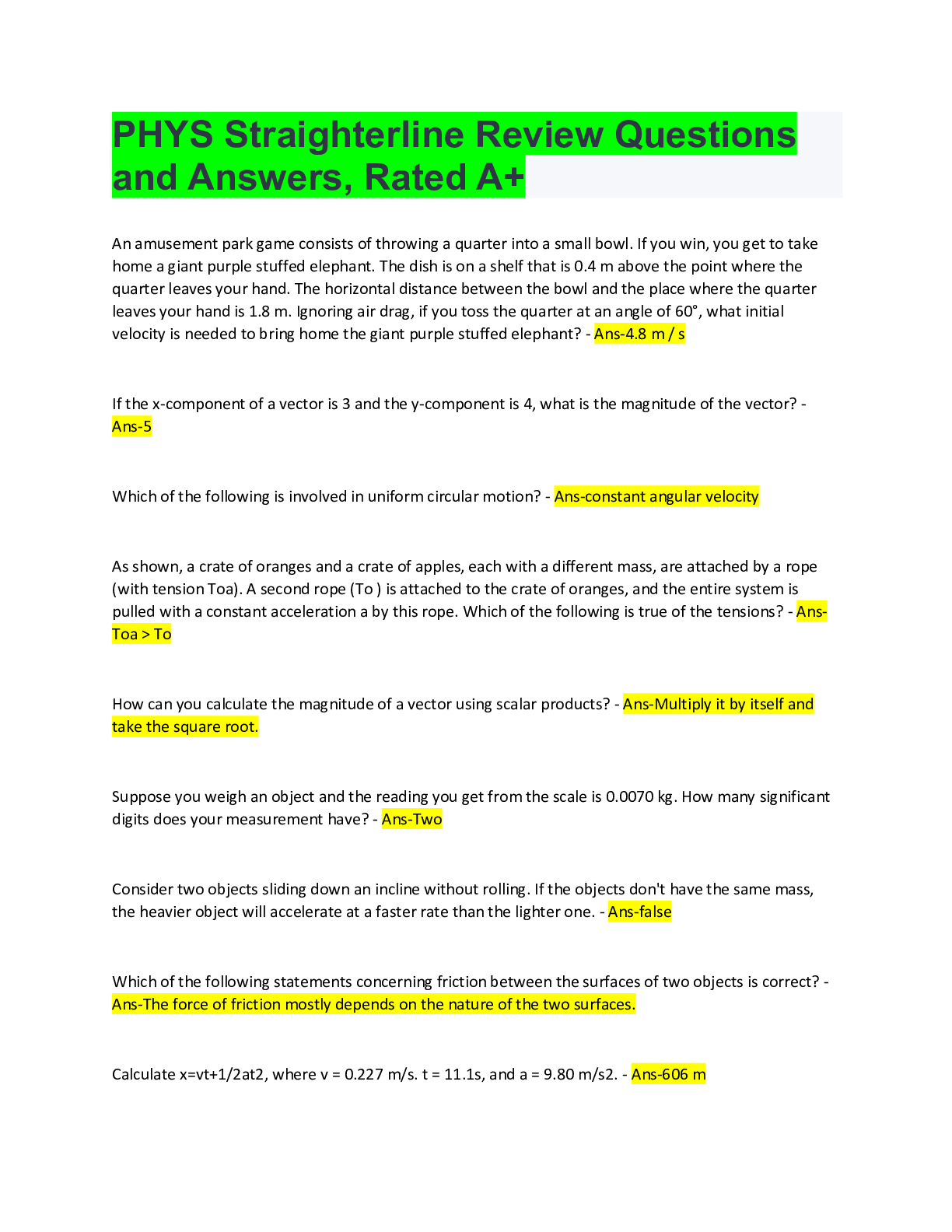Greek > QUESTION PAPER & MARK SCHEME > OCR A Level Classical Greek H444/01 Unseen Translation. QUESTION / MARKING SCHEME (All)
OCR A Level Classical Greek H444/01 Unseen Translation. QUESTION / MARKING SCHEME
Document Content and Description Below
1 Translate the following passage into English. Please write your translation on alternate lines. [50] The Spartan ephor Sthenelaides has urged his countrymen to declare war upon the Athenians, who... se aggression towards Sparta’s allies is contrary to the terms of their treaty. Persuaded by his speech, and fearing the growth of Athenian power, the Spartans vote in favour of the motion. ‘Therefore, Spartans, cast your votes for the honour of Sparta and for war. Do not allow the Athenians to grow still stronger. Do not betray our allies to ruin. Instead, let us, with the help of the gods, advance against the aggressors.’ τοιαῦτα λέξας ἐπεψήφιζεν, αὐτὸς ἔφορος ὢν, ἐς τὴν ἐκκλησίαν τῶν Λακεδαιμονίων. ὁ δέ (κρίνουσι γὰρ βοῇ καὶ οὐ ψήφῳ) οὐκ ἔφη διαγιγνώσκειν τὴν βοὴν ὁποτέρα μείζων, ἀλλὰ βουλόμενος αὐτοὺς φανερῶς ἀποδεικνυμένους τὴν γνώμην ἐς τὸ πολεμεῖν μᾶλλον ὁρμῆσαι ἔλεξεν ‘ὅτῳ μὲν ὑμῶν, ὦ Λακεδαιμόνιοι, δοκοῦσι λελύσθαι αἱ σπονδαὶ καὶ οἱ Ἀθηναῖοι ἀδικεῖν, ἀναστήτω ἐς ἐκεῖνο τὸ χωρίον,’ δείξας τι χωρίον αὐτοῖς, ‘ὅτῳ δὲ μὴ δοκοῦσιν, ἐς τὰ ἐπὶ θάτερα.’ ἀναστάντες δὲ διέστησαν, καὶ πολλῷ πλείους ἐγένοντο οἷς ἐδόκουν αἱ σπονδαὶ λελύσθαι. προσκαλέσαντές τε τοὺς ξυμμάχους εἶπον ὅτι σφίσι μὲν δοκοῖεν ἀδικεῖν οἱ Ἀθηναῖοι, βούλεσθαι δὲ καὶ τοὺς πάντας ξυμμάχους παρακαλέσαντες ψῆφον ἐπαγαγεῖν, ὅπως κοινῇ βουλευσάμενοι τὸν πόλεμον ποιῶνται, ἐὰν δοκῇ. ἐψηφίσαντο δὲ οἱ Λακεδαιμόνιοι τὰς σπονδὰς λελύσθαι καὶ πολεμητέα εἶναι οὐ τοσοῦτον τῶν ξυμμάχων πεισθέντες τοῖς λόγοις ὅσον φοβούμενοι τοὺς Ἀθηναίους μὴ ἐπὶ μεῖζον δυνηθῶσιν, ὁρῶντες αὐτοῖς τὰ πολλὰ τῆς Ἑλλάδος ὑποχείρια ἤδη ὄντα. Thucydides I. 87.1–4; 1.88.1 Words ἐπιψηφίζω I put to the vote ὁ ἔφορος, -ου an ephor (a Spartan official) διαγιγνώσκω I determine, distinguish ἀναστήτω ‘get up and stand’ ἐς τὰ ἐπὶ θάτερα ‘on the other side’ ἐπάγω here: I propose ὑποχείριος, -ον subject to, under the control of 5 10 15 3 © OCR 2021 H444/01 Oct21 Section B: Unseen Verse 2 (a) Translate the following passage into English. Please write your translation on alternate lines. [45] On their journey to Troy, the Greeks abandoned Philoctetes on an island because of an infected wound. Ten years later, Neoptolemus is sent to persuade Philoctetes to rejoin the army: to win the war, the Greeks need him to use the invincible bow given to him by Heracles. Philoctetes refuses, angry about the way in which he has been treated and still suffering with his wound. Here, Heracles resolves the dispute by revealing Philoctetes’ glorious future and telling both men to support one another if they wish to overpower Troy. Ἡρακλῆς ἐλθὼν δὲ σὺν τῷδ᾽ ἀνδρὶ πρὸς τὸ Τρωϊκὸν πόλισμα, πρῶτον μὲν νόσου παύσει λυγρᾶς, ἀρετῇ τε πρῶτος ἐκκριθεὶς στρατεύματος, Πάριν μέν, ὃς τῶνδ᾽ αἴτιος κακῶν ἔφυ, τόξοισι τοῖς ἐμοῖσι νοσφιεῖς βίου, πέρσεις τε Τροίαν, σκῦλά τ᾽ εἰς μέλαθρα σὰ πέμψεις, ἀριστεῖ᾽ ἐκλαβὼν στρατεύματος. ἃ δ᾽ ἂν λάβῃς σὺ σκῦλα τοῦδε τοῦ στρατοῦ, τόξων ἐμῶν μνημεῖα πρὸς πυρὰν ἐμὴν κόμιζε. καὶ σοὶ ταῦτ᾽, Ἀχιλλέως τέκνον, παρῄνεσ᾽· οὔτε γὰρ σὺ τοῦδ᾽ ἄτερ σθένεις ἑλεῖν τὸ Τροίας πεδίον οὔθ᾽ οὗτος σέθεν. ἀλλ᾽ ὡς λέοντες σύννομοι φυλάσσετε οὗτος σὲ καὶ σὺ τόνδ᾽· ἐγὼ δ᾽ Ἀσκληπιὸν παυστῆρα πέμψω σῆς νόσου πρὸς Ἴλιον. Sophocles, Philoctetes 1423–1438 (with omissions) Names Τρωϊκός, -ή, -όν Trojan ὁ Πάρις, -ιδος Paris (prince of Troy) ἡ Τροία, -ας Troy ὁ Ἀχιλλεύς, -έως Achilles (the father of Neoptolemus) ὁ Ἀσκληπιός, -οῦ Asclepius (god of healing) ὁ Ἴλιος, -ου Ilium, another name for Troy Words τὸ πόλισμα, -ατος city λυγρός, -ά, -όν destructive, dreadful νοσφίζομαι (future: νοσφιῶ) I deprive τὰ σκῦλά, -ων spoils, plunder τὸ μέλαθρον, -ου house τὰ ἀριστεῖα highest reward τὸ μνημεῖον, -ου memorial, acknowledgement ἄτερ (+ gen) without σθένω I have strength ὁ σύννομος, -ου companion, partner (b) Write out and scan lines 1 and 2. [5] ἐλθὼν δὲ σὺν τῷδ᾽ ἀνδρὶ πρὸς τὸ Τρωϊκὸν πόλισμα, πρῶτον μὲν νόσου παύσει λυγρᾶς END OF QUESTION PAPER 5 10 15 4 © OCR 2021 H444/01 Oct21 Oxford Cambridge and RSA Copyright Information OCR is committed to seeking permission to reproduce all third-party content that it uses in its assessment materials. OCR has attempted to identify and contact all copyright holders whose work is used in this paper. To avoid the issue of disclosure of answer-related information to candidates, all copyright acknowledgements are reproduced in the OCR Copyright Acknowledgements Booklet. This is produced for each series of examinations and is freely available to download from our public website (www.ocr.org.uk) after the live examination series. If OCR has unwittingly failed to correctly acknowledge or clear any third-party content in this assessment material, OCR will be happy to correct its mistake at the earliest possible opportunity. For queries or further information please contact The OCR Copyright Team, The Triangle Building, Shaftesbury Road, Cambridge CB2 8EA. OCR is part of the Cambridge Assessment Group; Cambridge Assessment is the brand name of University of Cambridge Local Examinations Syndicate (UCLES), which is itself a department of the University of Cambridge. Oxford Cambridge and RSA Examinations GCE Classical Greek H444/01: Unseen translation Advanced GCE 2021 Mark Scheme (DRAFT) This is a DRAFT mark scheme. It has not been used for marking as this paper did not receive any entries in the series it was scheduled for. It is therefore possible that not all valid approaches to a question may be captured in this version. You should give credit to such responses when marking learner’s work. Oxford Cambridge and RSA Examinations OCR (Oxford Cambridge and RSA) is a leading UK awarding body, providing a wide range of qualifications to meet the needs of candidates of all ages and abilities. OCR qualifications include AS/A Levels, Diplomas, GCSEs, Cambridge Nationals, Cambridge Technicals, Functional Skills, Key Skills, Entry Level qualifications, NVQs and vocational qualifications in areas such as IT, business, languages, teaching/training, administration and secretarial skills. It is also responsible for developing new specifications to meet national requirements and the needs of students and teachers. OCR is a not-for-profit organisation; any surplus made is invested back into the establishment to help towards the development of qualifications and support, which keep pace with the changing needs of today’s society. This mark scheme is published as an aid to teachers and students, to indicate the requirements of the examination. It shows the basis on which marks were awarded by examiners. It does not indicate the details of the discussions which took place at an examiners’ meeting before marking commenced. All examiners are instructed that alternative correct answers and unexpected approaches in candidates’ scripts must be given marks that fairly reflect the relevant knowledge and skills demonstrated. Mark schemes should be read in conjunction with the published question papers and the report on the examination. © OCR 2021 H444/01 Mark Scheme November 2021 3 1. Annotations Annotation Meaning Blank Page Noted but no credit given Specific improvement to be rewarded with a style mark (language); or creditable development of a point (literature) Division between sections of a translation Unclear Benefit of Doubt Repeated error; unpenalised; or consequential error resulting from a previous error; not to be re-penalised Major error, necessarily resulting in a reduced maximum mark for the section Incorrect: resulting in a reduced or no mark Not fully correct: possibly resulting in a reduced mark Omission, necessarily resulting in a reduced maximum mark for the section Point credited H444/01 Mark Scheme November 2021 4 2. Subject Specific Marking Instructions Guidance on applying the marking grids for translating into English The general principle in assessing each section should be the proportion (out of 5) of sense achieved. One approach for each section is given. Acceptable alternatives will be illustrated during Standardisation, but examiners should assess on its own merits any approach that satisfactorily conveys the meaning of the Greek – the crucial consideration being the extent to which every Greek word is satisfactorily rendered in some way in the English. The determination of what a “slight” error is only necessary when it is the only error in a section; this distinction will then determine whether a mark of 5 or 4 is appropriate. Where marks of 4, 3, 2, 1 and 0 are applicable, the overall proportion of meaning conveyed in the section is the only consideration. The term “major” error has been used here to determine an error which is more serious than a “slight” error. The classification below should be seen only as a general guide, the intention of which is to maintain standards year-on-year. Lead markers should consider each instance on its own merits in the context of the passage and the section. It is likely that some of the errors below may be regarded as “major” if they appear in a relatively short and straightforward section, whereas in longer or more complex sections they are more likely to be a “slight” error. The sort of errors that we would generally expect to be considered as “slight” errors would be: • a single mistake in the translation of a verb, for example incorrect person or tense • vocabulary errors that do not substantially alter the meaning • omission of particles that does not substantially alter the meaning (although in certain cases the omission of a particle may not count as an error at all, most especially with μεν... δε) The sort of errors that we would generally expect to be considered as “major” errors would be: • more than one slight error in any one verb • vocabulary errors that substantially alter the meaning • omission of a word or words, including alteration of active to passive if the agent is not expressed • missed constructions • alteration in word order that affects the sense The final decisions on what constitutes a ‘slight’ and ‘major’ errors will be made and communicated to assessors via the standardisation process (after full consideration of candidates’ responses) and these decisions will be captured in the final mark scheme for examiners and centres. H444/01 Mark Scheme November 2021 5 Marks Description 5 Accurate translation with one slight error allowed 4 Mostly correct 3 More than half right 2 Less than half right 1 Little recognisable relation to the meaning of the Greek 0 = No response or no response worthy of credit. H444/01 Mark Scheme November 2021 6 Section A: Unseen Prose Question Answer Mark Guidance The passage has been divided into 10 sections, each worth 5 marks. Award up to 5 marks per translated section according to the 5-mark marking grid found above. (i) τοιαῦτα λέξας ἐπεψήφιζεν, αὐτὸς ἔφορος ὢν, ἐς τὴν ἐκκλησίαν τῶν Λακεδαιμονίων. Having said / saying these things he himself, as / being Ephor, put the question to the assembly of the Lacedaimonians / Spartans. 5 a short section: all errors will be major accept ‘with these words’ accept ‘put the vote to’ accept ‘being Ephor himself’ (ii) ὁ δέ (κρίνουσι γὰρ βοῇ καὶ οὐ ψήφῳ) οὐκ ἔφη διαγιγνώσκειν τὴν βοὴν ὁποτέρα μείζων, (And/but) he said that he could not determine which shout was louder / greater (for they make their decisions by shouting (and) not by voting), 5 accept alternative position for parenthetical clause slight error: οὐκ taken as negating ἔφη (ie ‘did not say’) rather than διαγιγνώσκειν slight error: μείζων translated as a superlative major error: ὁ δέ as plural (iii) ἀλλὰ βουλόμενος αὐτοὺς φανερῶς ἀποδεικνυμένους τὴν γνώμην ἐς τὸ πολεμεῖν μᾶλλον ὁρμῆσαι ἔλεξεν but wanting them to show their opinion openly and (so) to urge them on more for war he said 5 accept more literal translation (eg. ‘having shown their opinion’) provided that participle and main verb(s) are co-ordinated. accept any reasonable translation of ὁρμῆσαι but not ‘set out’ slight error: missing the active/transitive force of ὁρμῆσαι Allow flexibility as regards in/transitive nature of this verb. major error: missing the connection between βουλόμενος and ὁρμῆσαι ἔλεξεν: possible repeated error from (i) H444/01 Mark Scheme November 2021 7 (iv) ‘ὅτῳ μὲν ὑμῶν, ὦ Λακεδαιμόνιοι, δοκοῦσι λελύσθαι αἱ σπονδαὶ καὶ οἱ Ἀθηναῖοι ἀδικεῖν, ‘Spartans, whoever of you think(s) that the treaty has been broken and (that) the Athenians have done wrong, 5 slight error: Athens for Athenians slight error: ‘treaties’ for σπονδαὶ major error: ὅτῳ translated as subject of δοκοῦσι, eg. ’whoever seems’ Λακεδαιμόνιοι: possible repeated error from (i) (v) ἀναστήτω ἐς ἐκεῖνο τὸ χωρίον,’ δείξας τι χωρίον αὐτοῖς, ‘ὅτῳ δὲ μὴ δοκοῦσιν, ἐς τὰ ἐπὶ θάτερα.’ (let him) get up and stand in that place,’ pointing out a (certain) place to them, ‘but whoever does not think so / thinks they haven’t, (stand) on the other side.’ 5 accept ‘over there’ for ἐκεῖνο τὸ χωρίον accept aorist translation of δείξας slight error: ‘district’ or ‘land’ for τὸ χωρίον major error: μὴ interpreted as introducing a prohibition or negative purpose clause χωρίον: possible repeated error ὅτῳ...δοκοῦσιν: possible repeated error from (iv) (vi) ἀναστάντες δὲ διέστησαν, καὶ πολλῷ πλείους ἐγένοντο οἷς ἐδόκουν αἱ σπονδαὶ λελύσθαι. And / then getting up / they got up and separated / stood apart, and there were many more who thought that the treaty had been broken. 5 accept literal translation of ‘οἷς ἐδόκουν αἱ σπονδαὶ λελύσθαι’, eg. ‘for whom the treaty seemed to have been broken’ slight error: missing the prefix in διέστησαν slight error: missing the comparative force of πλείους ἀναστάντες: possible repeated error from (v) λελύσθαι...αἱ σπονδαὶ: possible repeated error(s) from (iv) (vii) προσκαλέσαντές τε τοὺς ξυμμάχους εἶπον ὅτι σφίσι μὲν δοκοῖεν ἀδικεῖν οἱ Ἀθηναῖοι, 5 major error: taking τοὺς ξυμμάχους as subject of εἶπον or οἱ Ἀθηναῖοι as object of ἀδικεῖν (eg. ‘to harm the Athenians’) δοκοῖεν: possible repeated error from (iv) and (v) H444/01 Mark Scheme November 2021 8 (Then) summoning the(ir) allies they said that they had decided / it seemed to them that the Athenians had done wrong, ἀδικεῖν οἱ Ἀθηναῖοι: po [Show More]
Last updated: 1 year ago
Preview 1 out of 16 pages
.png)
Reviews( 0 )
Document information
Connected school, study & course
About the document
Uploaded On
Jul 16, 2022
Number of pages
16
Written in
Additional information
This document has been written for:
Uploaded
Jul 16, 2022
Downloads
0
Views
77

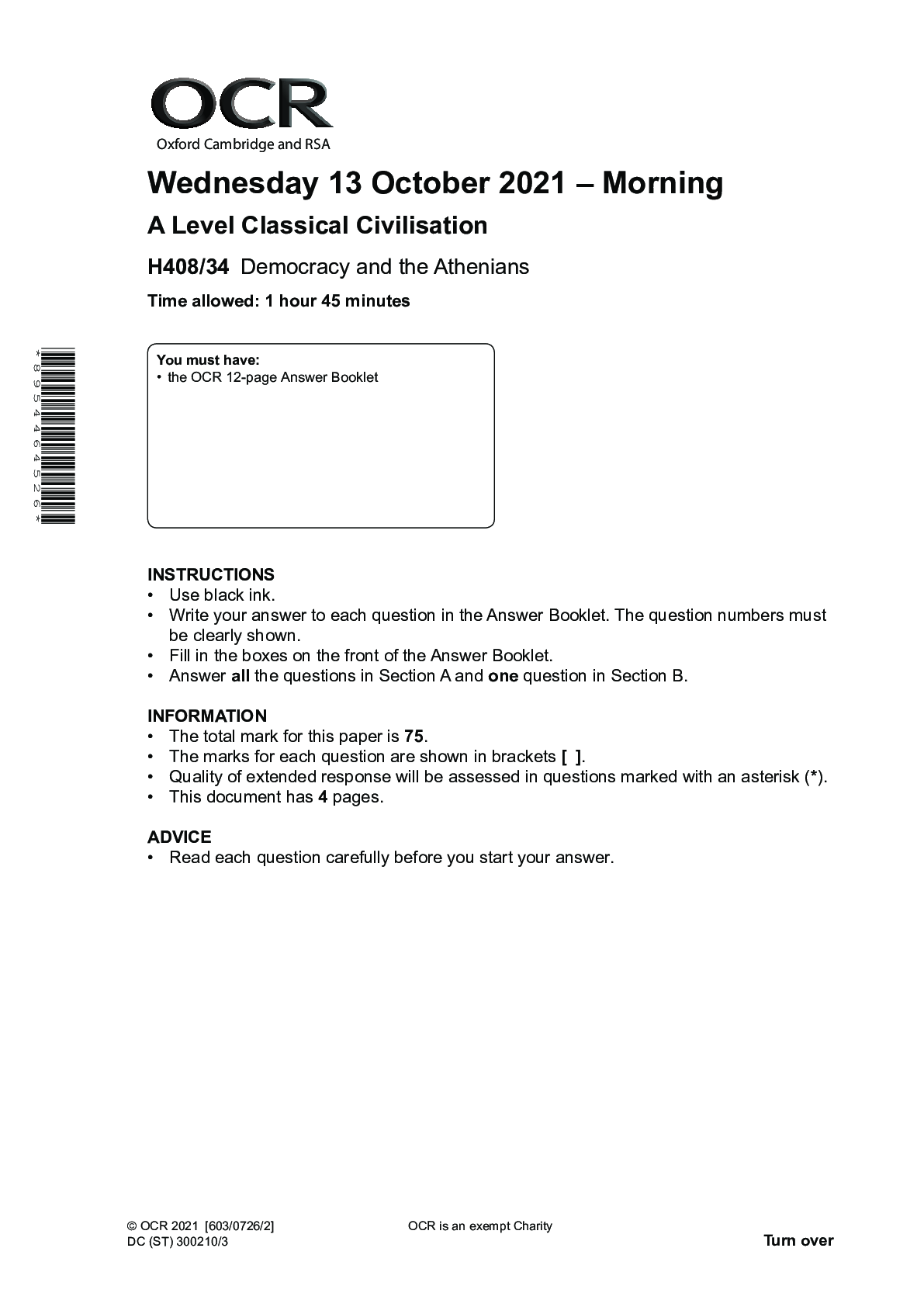
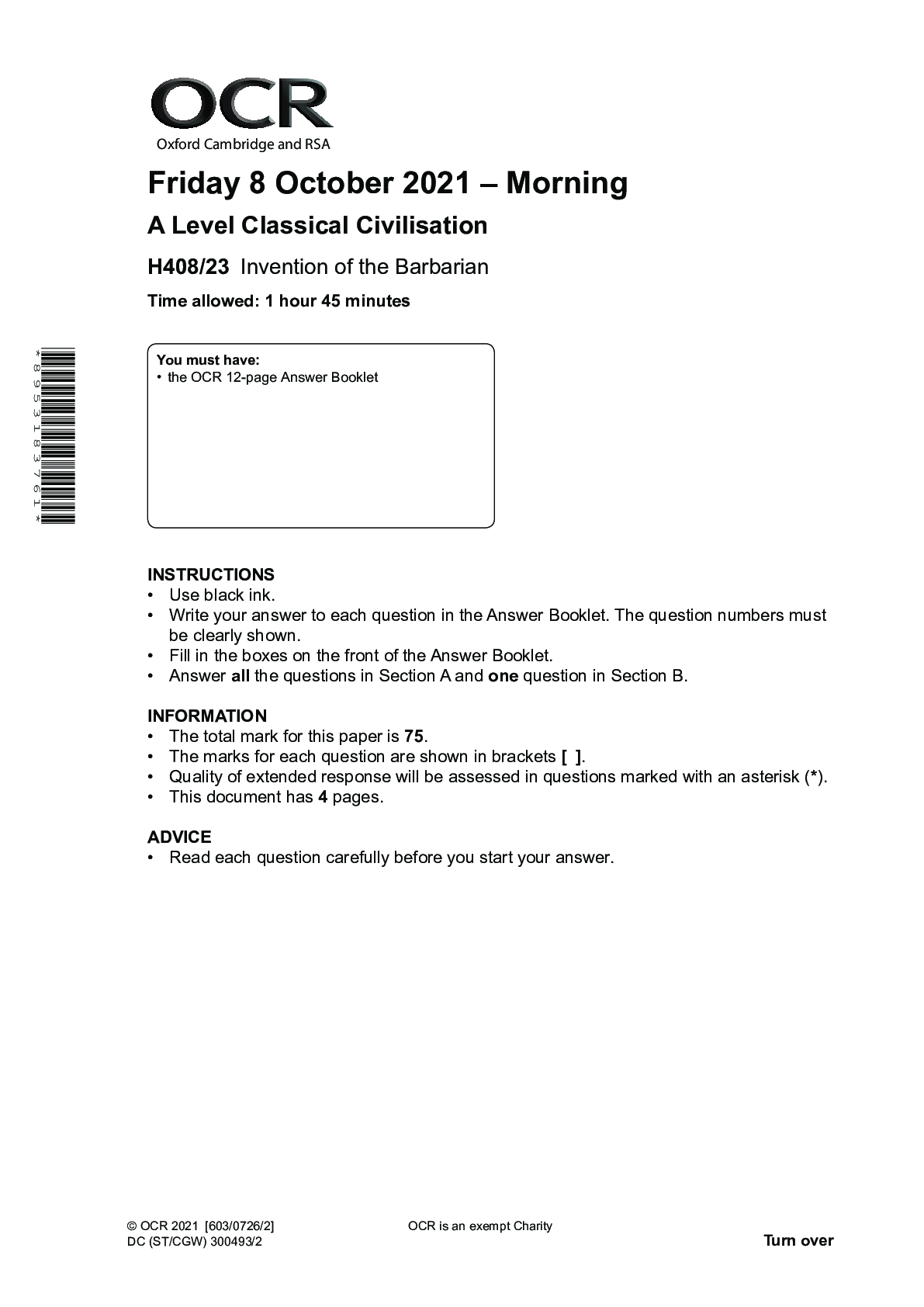
.png)
.png)

.png)
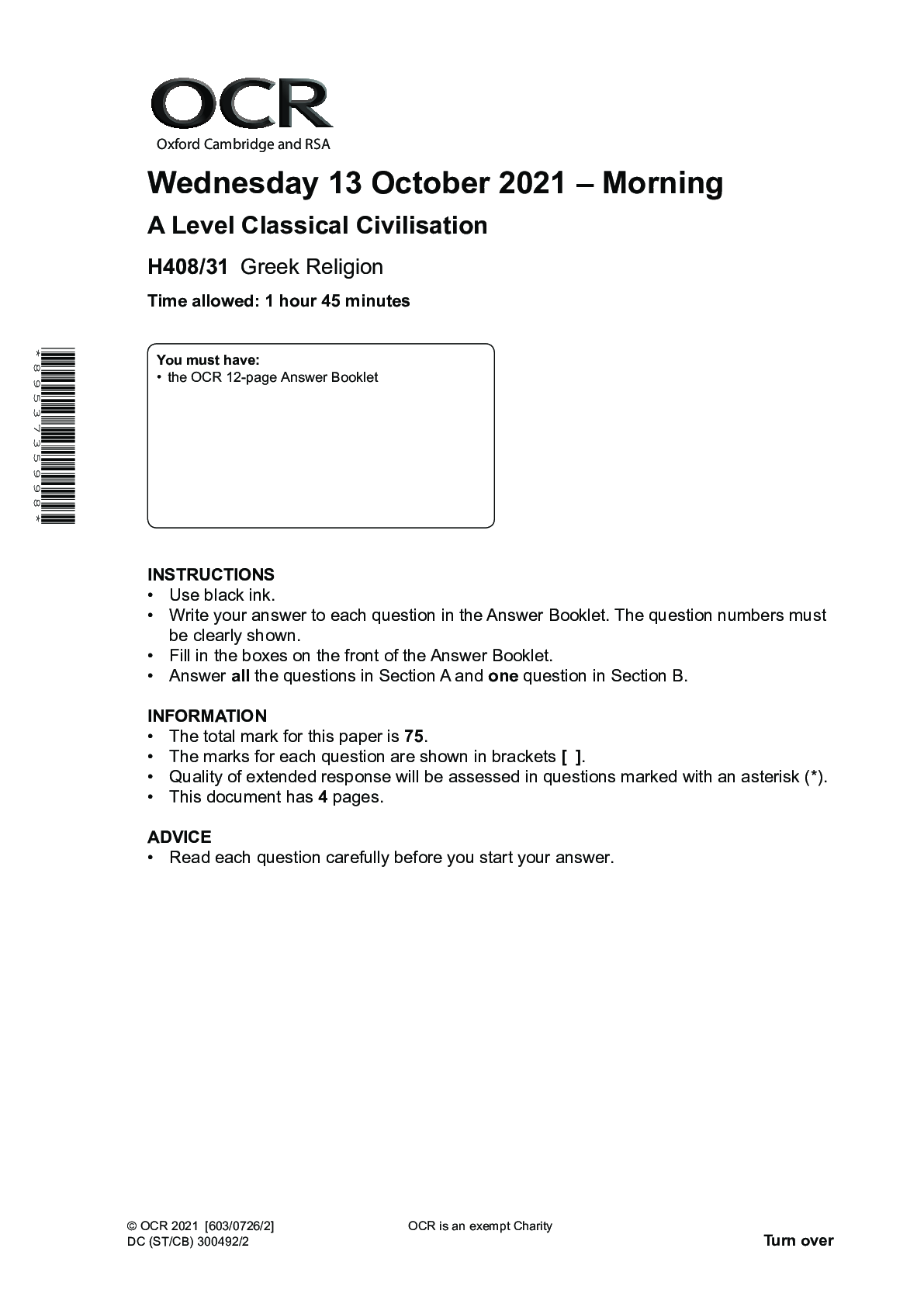
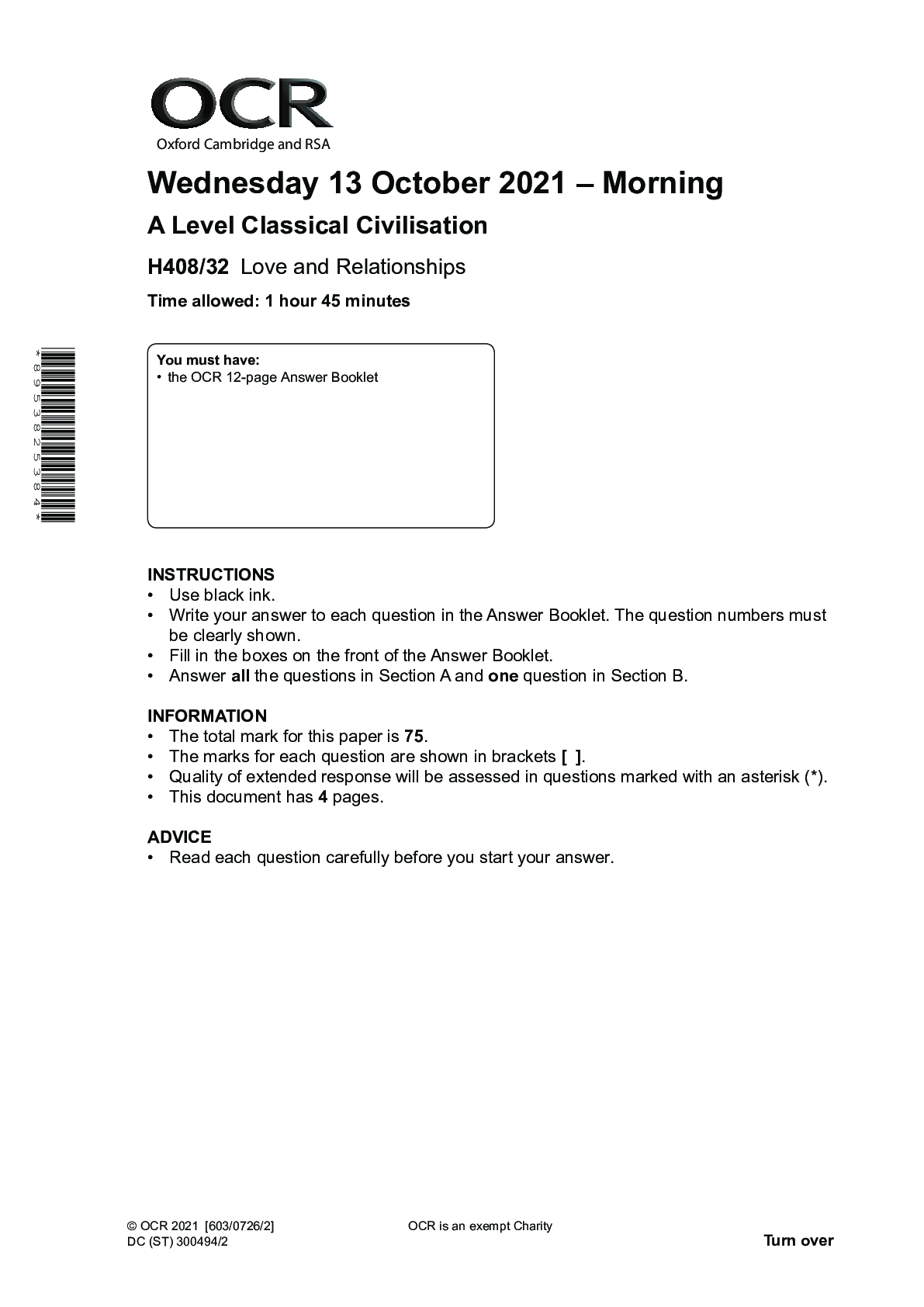
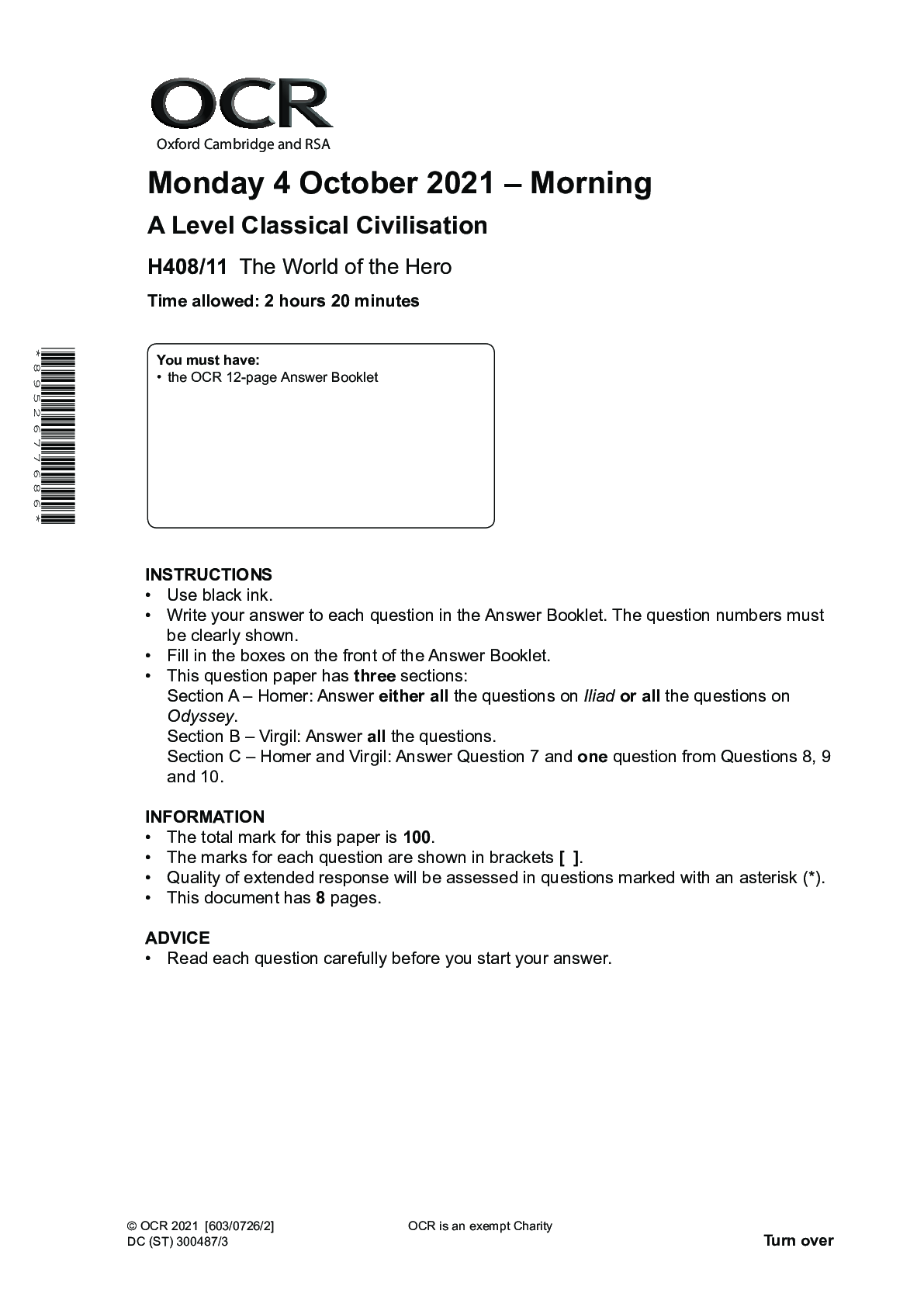
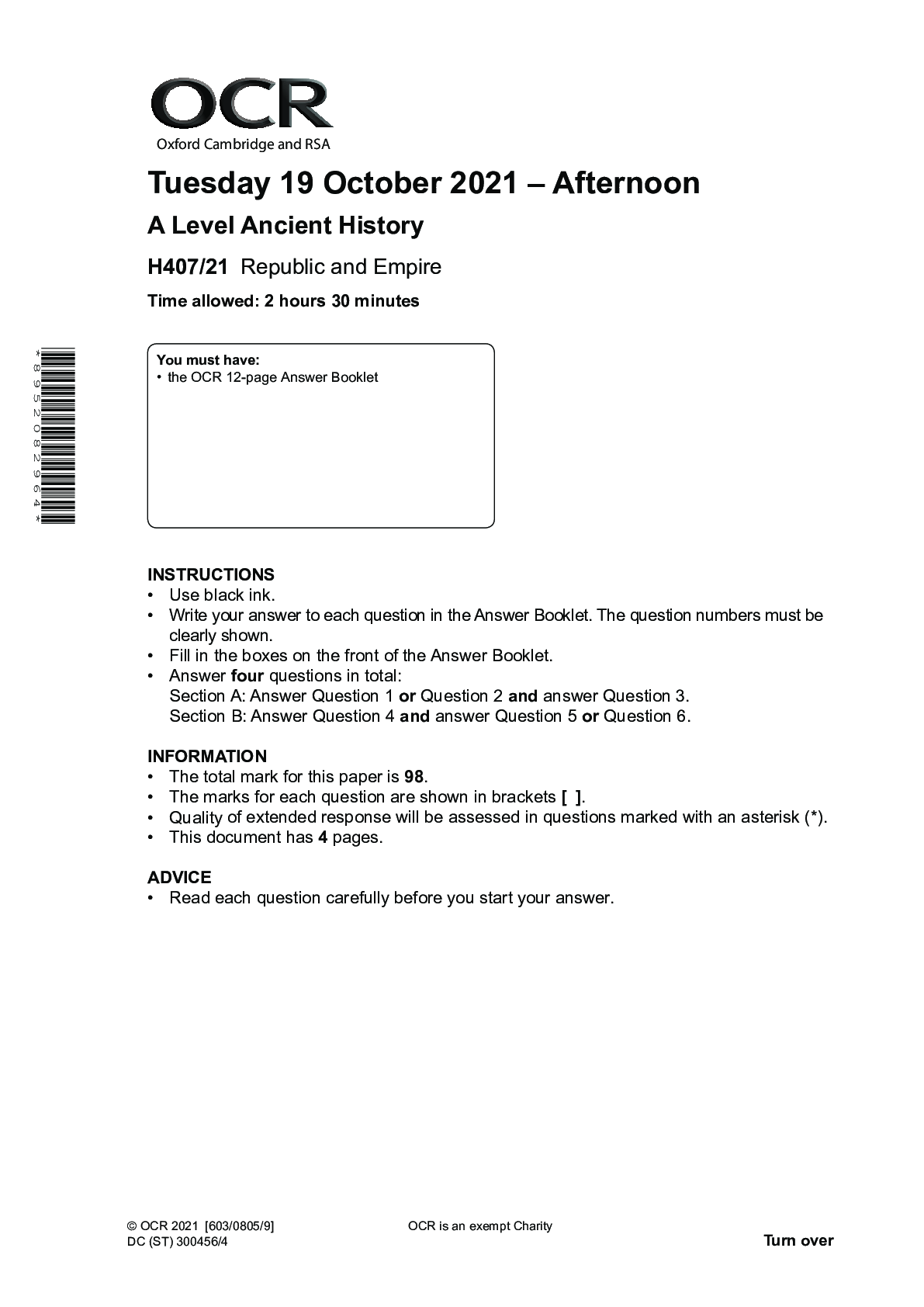
.png)
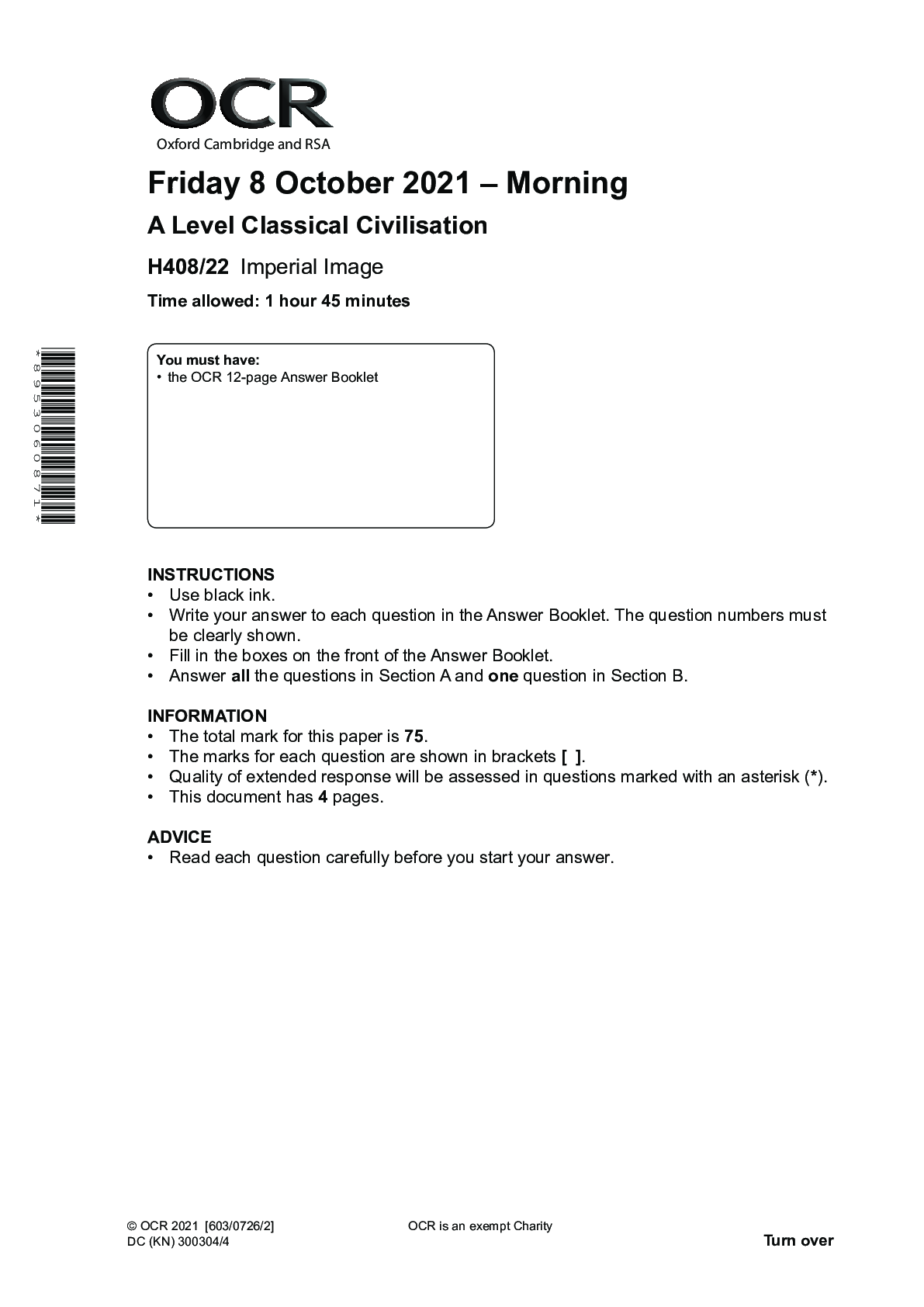
.png)
.png)
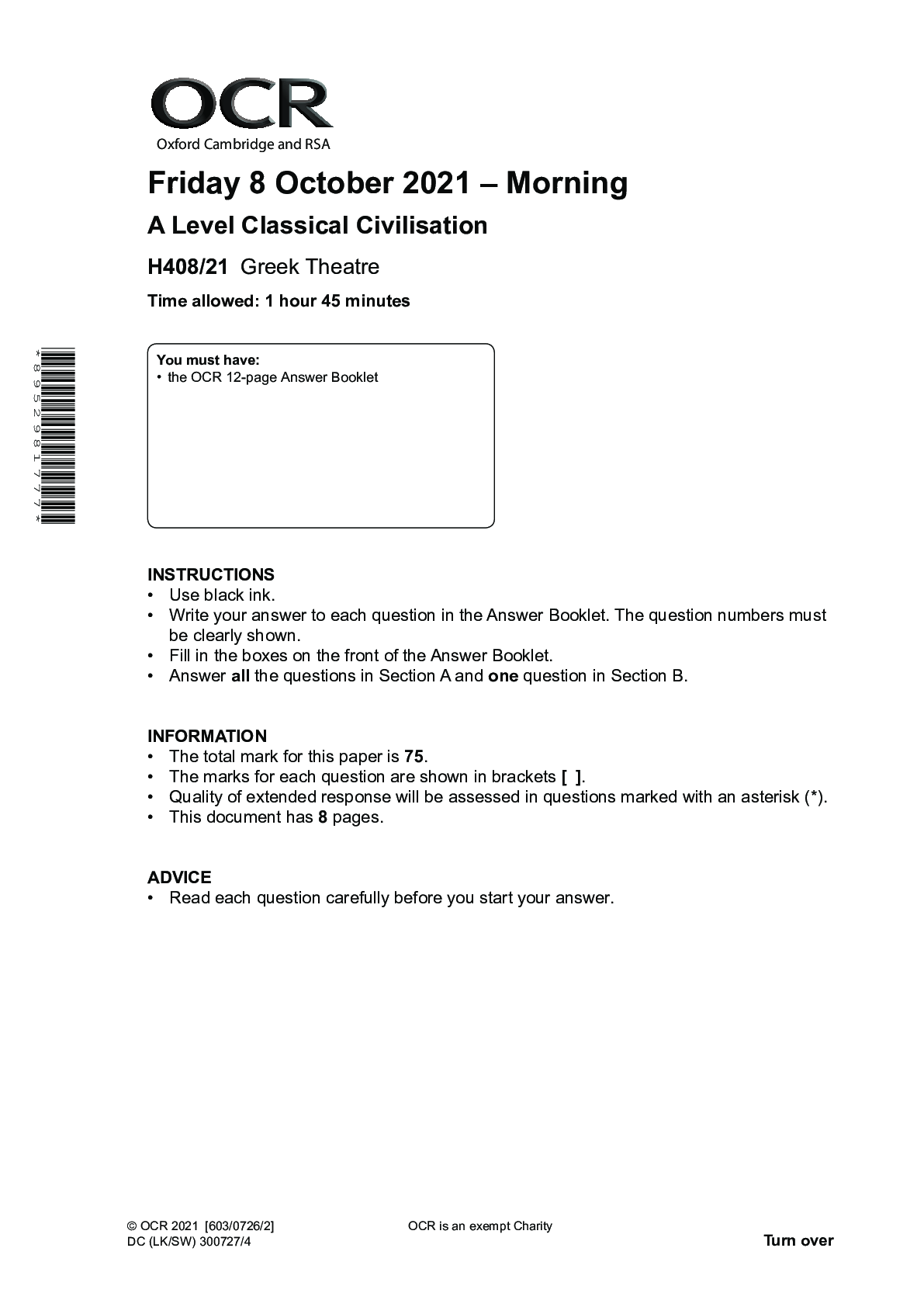
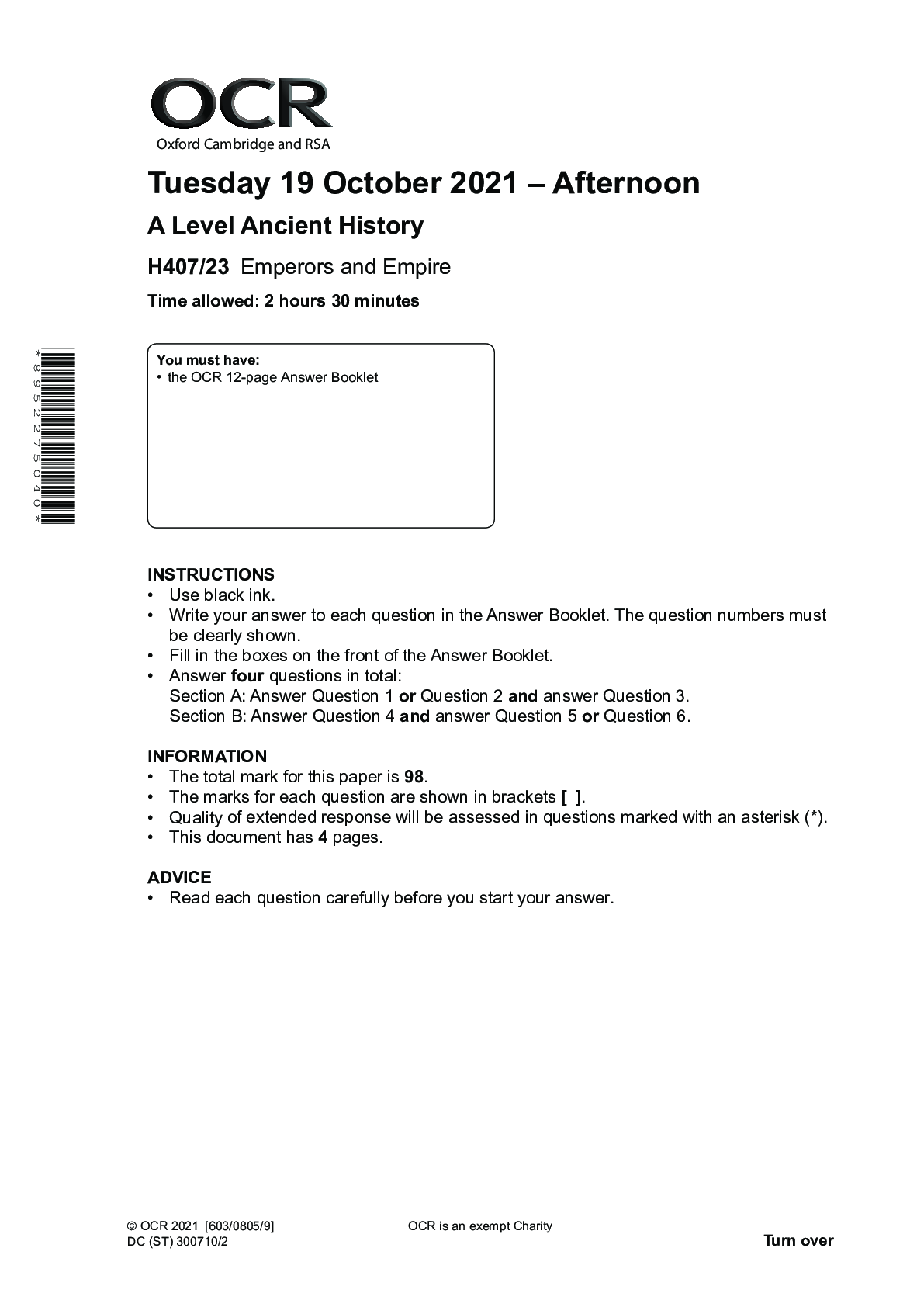
.png)
.png)
.png)

